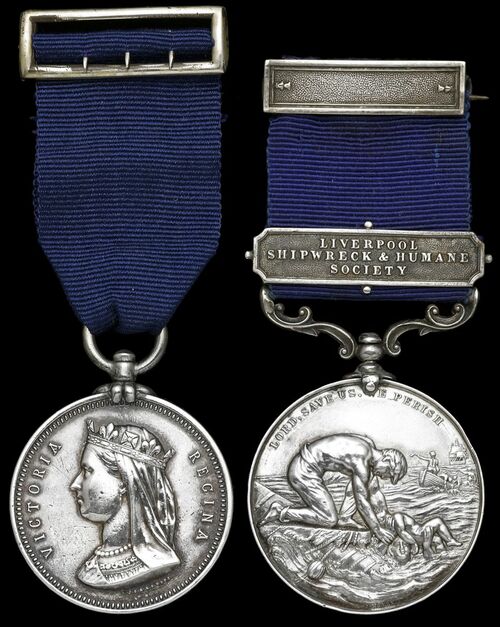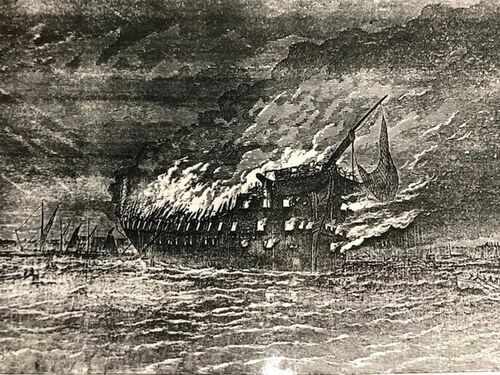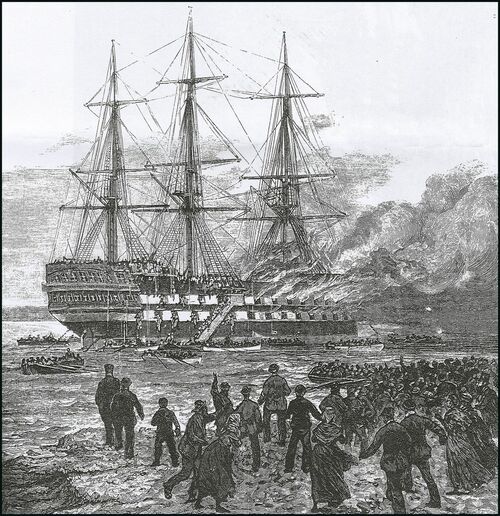Auction: 23003 - Orders, Decorations and Medals
Lot: 240
An extremely rare and important family life saving pair for the burning of the Training Ship Goliath in 1875
Liverpool Shipwreck and Humane Society, Bramley-Moore Medal for saving life at sea, silver, with silver ribbon bar inscribed 'Liverpool Shipwreck and Humane Society (Staff Commr. Willm. S. Bourchier, R.N., for courage and humanity at the fire on the training ship Goliath Dec 22. 1875) with silver ribbon buckle
The Maharajah of Burdwan's Medal, silver, 'For Gallant Conduct at the burning of H.M.S. Goliath 22nd Decr. 1875' (Miss Ethel Bourchier) the first good very fine, the latter nearly very fine (2)
Goliath was a wooden line-of-battleship which had an unusual career, for she did not proceed to sea after completion, but was laid up in the Medway until the outbreak of the Crimean War.
At the conclusion of the Crimean War, in which the vessel took no part, she was converted to steam and her armament reduced to 60 guns. She served for about five years, when she was again laid up until 1870, in which year she was loaned by the Admiralty to the Metropolitan Asylums Board for the training of pauper boys from an association of metropolitan parishes.
Goliath was under command of Capt. Bouchier, R.N., with a complement of 458 boys, besides officers. The Captain's two daughters also lived on board the ship. On Wednesday morning, December 22nd, 1875, just before 8 o'clock, a fire broke out in the lamp room on the main deck. At the time the lamps were being extinguished and one was inadvertently dropped by a lad named Loeber. The oil was upset over the deck and immediately caught fire, the lad Loeber with great presence of mind flung his jacket on the flames and sat down on it, hoping by this means to prevent them spreading. His courage was unavailing, however, and although the pumps were manned with all speed, and admirable discipline prevailed, in a few minutes the fire had established a firm hold on the ship.
The boats were hanging from their falls on the upper deck and the flames burned away the ropes so that they fell end-on to the water, finally dropping away and sinking. There was a fresh breeze blowing through the open ports and this fanned the fire between decks to furnace heat. Fortunately most of the boys managed to save themselves by swimming to barges and boats moored in the river, and as Goliath was lying off Grays close to passing shipping there was no lack of help.
The boats of the training ship Arethusa rendered great service in saving life and Capt. Walter of that vessel was awarded the medal of the Royal Society for the Protection of Life from Fire. The death roll amounted to 12 men and boys. Capt. Bourchier, whose two daughters saved themselves by swimming to passing craft, was the last to leave the ship.
The Times of London 1st January 1876, carried the findings and recommendations of the Coroner's Inquest:
'Every boy behaved himself like a man. Had they not been well disciplined, calamity would have been widespread, but they were free from all panic and tumult. The l4-year-old boy who dropped the lighted lamp (Loeber) in the lamp-room gave his evidence in a honest and manly way, as did all concerned.'
In addition to the award of the Bramley-Moore silver medal to Commander Bourchier by the Liverpool Shipwreck and Humane Society, a rather special and unique medal was struck to reward those who had distinguished themselves in the rescue work.
The London Times of 30 December 1875 indicated that the Lord Mayor, William Cotton, was initiating a Mansion House Fund to 'repair personal losses and to reward the bravery of the boys and officers of the Goliath...' This report and others detailing the incident were seen by the Maharaj of Burdwan, who subsequently wrote to the Times and offered to present a medal to those who had distinguished themselves. His letter was printed in the Times of 22 February 1876 (page 12a) and reads as follows:
‘The Palace, Burdwan, India, Jan. 28, 1876'
‘To The Editor of The Times'
Sir, - Having read with greatest admiration the account of the heroic conduct displayed by some of the boys of the training ship GOLIATH on the occasion of the recent destruction by fire of that ill-fated vessel, I have felt a strong wish to present a silver medal to each of those who signally distinguished themselves on that occasion. I may have been forestalled in this wish, but I trust that I may be allowed to do something of the kind, as, coming from India, it will prove to the boys that deeds like theirs have not merely a local fame, but are marked and appreciated by their fellow subjects in the most distant parts of Her Majesty’s Empire. I have taken the liberty of addressing you upon the subject, as I have been unable to ascertain the name of the Society to which the ship belonged. I should have written direct to its offices had I been able to discover it, and I have, therefore to beg that, while pardoning me for the trouble I am giving you, you will do me the further favour of onwarding to the proper authorities the enclosed draft to cover the cost of the medals, and of intimating that, if necessary, I shall be happy to remit a further sum.'
Only 22 awards were made of the silver Bramley-Moore medal. It is not known how many of the Maharajah of Burdwan's medals were struck or awarded, but at least six are known to exist. Sold with further research including extensive reports from The Times.
Subject to 20% VAT on Buyer’s Premium. For more information please view Terms and Conditions for Buyers.
Sold for
£1,800
Starting price
£1400









